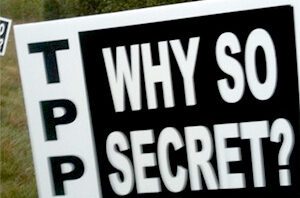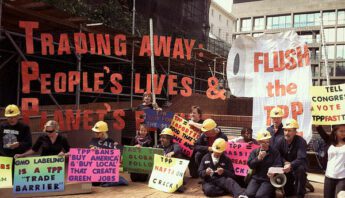The Trans-Pacific Partnership (TPP) has just been signed by all twelve participating countries. But the massive and highly controversial trade agreement still has a long and rocky road ahead before it can go into effect.
The Trans-Pacific Partnership (TPP) has just been signed by all twelve participating countries. But the massive and highly controversial trade agreement still has a long and rocky road ahead before it can go into effect.
The deal must be ratified by Congress, whose leadership is increasingly opposed to letting the TPP become law. Meanwhile, the growing movement against the TPP even has presidential frontrunners in both parties criticizing aspects of the agreement, if not opposing the whole thing.
Bad for farming
President Obama continues to tout the agreement as one of his top legislative priorities for his remaining time in office, despite widespread and persistent opposition from labor unions, environmental groups, and even industry groups like automakers and tobacco companies. We’ve written before about how and why TPP will be bad for our food system; farmer groups like the National Farmers Union (NFU) continue to strongly oppose the deal. After the release of the full text in November, NFU President Roger Johnson said:
After years of negotiating in secret for an enormous agreement guarded from the public under lock and key, the text of the TPP has at last been made public. Unfortunately, it appears to be as bad for America’s family farmers and ranchers as we had feared.
The full text of the TPP also revealed how the Intellectual Property Rights (IPR) chapter would negatively effect farmers and bolster the Big 6. According to Ben Lilliston from the Institute for Agriculture and Trade Policy,
The TPP’s IPR chapter provides a glimpse into what this new mega free trade deal is all about. The chapter’s requirement that countries grant patent protection for multinational biotech seed companies has little to do with trade and nothing to do with respecting farmers’ innovations, their livelihoods or countries’ food security. It is about asserting, in a very raw way, corporate power over sovereign nations and the farmers who live there.
Opposition is growing
So who will win this trade battle? Only time will tell, but recent signs from Congress have made me more optimistic than ever that we can stop this thing.
First off, Senate Minority Leader Harry Reid has not wavered in his opposition to the TPP — so to achieve ratification, Obama will need Republican leadership on board. However, in a recent meeting with Senate Majority Leader Mitch McConnell and House Speaker Paul Ryan, Obama failed to get the Republicans to commit to push the TPP forward. McConnell announced in a statement after the meeting that he has problems with the agreement and wants to wait until after November’s election to call for a vote.
Why would there be more support in Congress after the election? Because TPP is so unpopular with the public that our elected officials are afraid to vote “yes” right before they face re-election. Presidential candidates are taking this cue as well: Democratic frontrunners Hillary Clinton and Bernie Sanders both publicly oppose the TPP, as does Republican frontrunner Donald Trump. Republican candidates Ted Cruz and Marco Rubio previously showed support for the treaty, but throughout their presidential campaigns have expressed criticisms.
Tell Congress to say no
Now that the TPP is signed, it will be sent to Congress for review and approval. So don’t wait — tell Congress to oppose the TPP now — and share our action alert with others. Obama will do his best to get a vote on TPP soon; we need to do all we can to make it an uphill battle.
And don’t forget about that other massive trade deal in the works — the Transatlantic Trade and Investment Partnership (TTIP). The agreement between the United States and the European Union is nearing the finish line, now entering its twelfth round of negotiations. While the TTIP is flying relatively under the radar, most trade deal opposition groups are betting that if we can stop TPP, it will be easier to stop TTIP as well.








